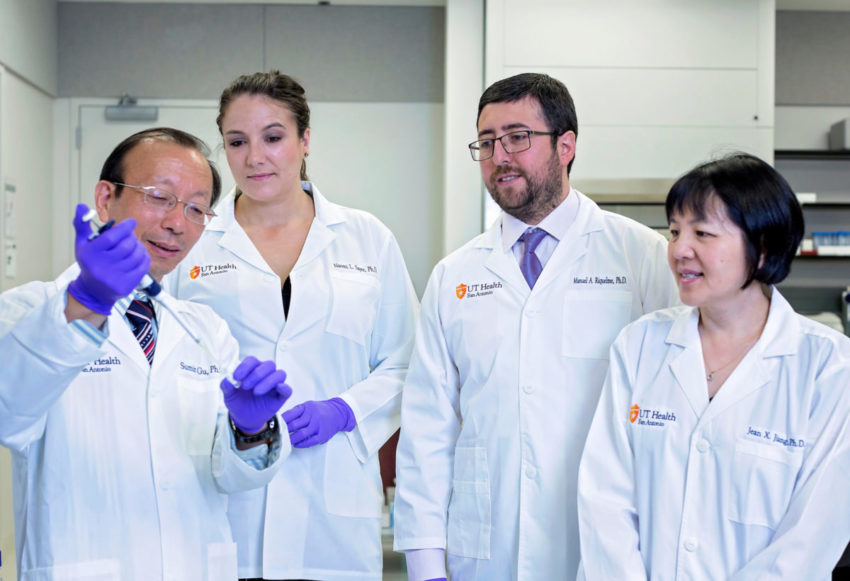UT Health San Antonio and UT Health Houston announced agreements June 23 to grant exclusive global licenses for two unique biologic therapeutics to AlaMab Therapeutics Inc., a subsidiary of CSPC Pharmaceutical Group Ltd. The biologics will be developed into novel, first-in-class therapies for spinal cord injury and breast cancer bone metastasis.
The exclusive global license agreements are the most financially significant in UT Health San Antonio history. Under the agreements, AlaMab will make an initial upfront payment of $4.5 million to license the technologies. The agreement also calls for UT Health San Antonio and UT Health in Houston to be eligible for further milestone payments emerging from the research collaboration if the biologics meet scientific and regulatory goals. The two UT institutions are also eligible for royalties from revenues if the biologics are approved for sale. The total of all milestone payments is capped at $114 million. CSPC and AlaMab will seek regulatory approval in the United States, China and other global markets. Additionally, AlaMab has indicated intent to further partner with UT Health San Antonio to support the preclinical investigation and development of the therapeutics to include new indications.
“Today, we celebrate innovation and intellectual property developed at UT Health San Antonio, and we spotlight the economic development generated by executed licenses, a new bioscience startup company in our city and a global research partnership,” said William L. Henrich, M.D., MACP, president of UT Health San Antonio.
CSPC Pharmaceutical Group is a Chinese pharmaceutical company with integrated capability in new drug research and development, manufacturing, marketing and sales, and is listed on the Hong Kong Stock Exchange.
“AlaMab Therapeutics is an integral part of CSPC’s growth strategy dedicated to the discovery and development of novel biologics entities aimed at addressing the unmet medical needs of patients worldwide,” said Weidong Pan, CEO and executive director on the CSPC Pharmaceutical Group Board of Directors.
The initial discovery of the antibodies is based on research by Jean Jiang, Ph.D., Ashbel Smith Professor at UT Health San Antonio. Dr. Jiang is a tenured professor of biochemistry and structural biology in the university’s Joe R. & Teresa Lozano Long School of Medicine.
Dr. Jiang studies a group of proteins called connexins. These proteins form channels in the cell, which plays very important roles in physiological and pathological (disease-related) processes in neuronal and skeletal tissues. Dr. Jiang’s innovation involves the understanding of the connexin 43 hemichannels’ role in the pathologic process. Dr. Jiang utilized the knowledge to develop a strategy and discovery of two biologics for intervention that would be useful for various clinical indications. One antibody can inhibit the neural inflammatory reaction and suppress further damage after spinal cord injury, which can help recovery, while the second antibody is useful in breast cancer metastasis to the bone, Dr. Jiang said. Both antibodies were initially derived in the Jiang laboratory in San Antonio.
Dr. Jiang then collaborated with Zhiqiang An, Ph.D., of UT Health in Houston to humanize the antibodies for further preclinical and in vivo efficacy studies. Dr. An, professor and director of the Texas Therapeutics Institute at The Brown Foundation Institute of Molecular Medicine for the Prevention of Human Diseases, and the Robert A. Welch Distinguished University Chair in Chemistry at UT Health in Houston, is an international expert on the humanization of monoclonal antibodies. Humanization is an important path toward advanced development on the way to commercialization.
Dr. Jiang joined the UT Health San Antonio faculty in 1997 after being a postdoctoral fellow and then an instructor at Harvard Medical School. She completed her Ph.D. at the State University of New York at Stony Brook, and is the author of more than 100 scientific publications.
Dr. Jiang’s track record of innovative and excellent research has attracted more than $10.2 million to UT Health San Antonio, including nearly $9.2 million from the National Institutes of Health and $925,000 from The Welch Foundation.
“The executed license agreements with a global company showcase how Dr. Jiang and our colleagues at UT Health San Antonio are excelling at addressing the complexity of today’s diseases and translating discoveries in biomedical research into inventions,” said Andrea Giuffrida, Ph.D., vice president for research and professor of pharmacology at UT Health San Antonio.
President Henrich said the licensing agreements demonstrate the importance of consistent federal funding to institutions such as UT Health San Antonio. Federal grants advance discoveries that lead to intellectual property in the labs of UT Health San Antonio, which boosts the city’s life sciences industry and ultimately benefits humanity.
The Office of Technology Commercialization (UT Health San Antonio) and the Office of Technology Management (UT Health in Houston) worked together to protect the intellectual property as well as develop the commercial strategy on the antibodies. “This is truly a remarkable international collaboration on many levels,” said John Gebhard, Ph.D., assistant vice president, technology commercialization, for UT Health San Antonio. “Ideally, we seek long-term alliances where we leverage academic and industry expertise. The agreement with AlaMab Therapeutics Inc. represents a win for the investigator, institution and industry, and most importantly a win for the patient.”
The agreement also illustrates the power of collaboration of two University of Texas System institutions to advance patient care worldwide, Dr. Gebhard said.


